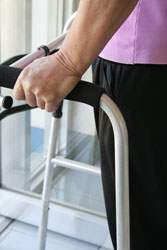Fitness for autonomous living of the elderly
In an effort to maintain indoor and outdoor mobility, postural stability and self-care, the BETTER_AGEING project investigated physical frailty and loss of functional independence in the elderly. More specifically, the project work involved research on the causes of physical frailty from whole body level to single muscle cells. In addition, a standard physical training programme was developed and implemented for a year in order to evaluate its effects and benefits. An important aspect was the identification of the relationship between strength, power and performance in daily activities. On the basis of an elderly population sample of healthy community-dwelling men and women above 75 years, a study was conducted for profiling muscle function, functional ability and physical activity. The study involved partially supervised, home-based or mixed training programmes for assessing functional ability in relation to muscle power. The objective was to specify the determinants and adaptations to a long-term mixed strength training programme of a moderate intensity. The programme was performed either twice a week in a hospital-based training facility equipped with two multi-gym machines or once a week at home with the aid of elastic bands. Examples of measurements included isometric strength of knee extensors, ankle plantar flexors and leg extensor power. In addition, abilities of functional reach, chair and bed rise, six-minute walking test, stair climbing, get up and go, as well as one-leg standing were also evaluated. Muscle power was proven to be a significant determinant of performance for women, while this was less important for men. Although women were generally found weaker than men, training showed significant gains in female muscle function and functional ability. Men however were shown to improve only their functional ability. Hence, adoption of a similar training programme may have a positive impact on the abilities of the elderly population, particularly the female section in performing autonomic daily life activities.







